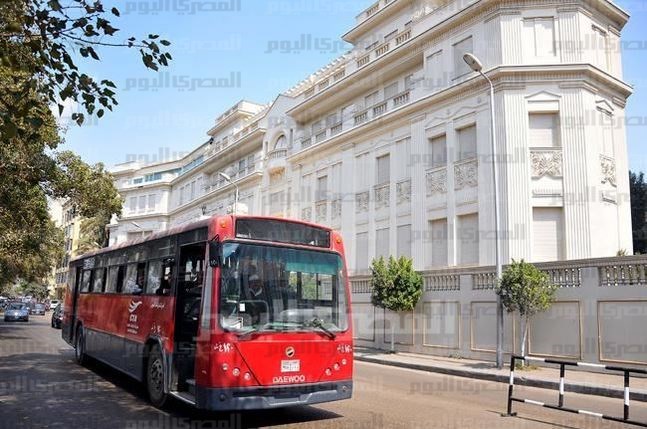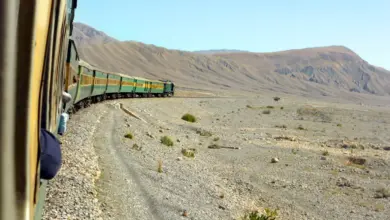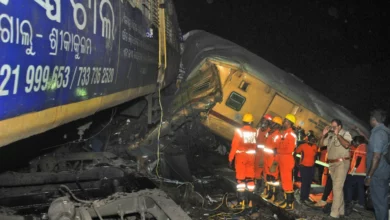
Despite assurances of increased security for Egypt's public transportation, many commuters still remain unprotected from the possibility of terrorist attacks without adequate security personnel and frequent checks needed to secure trains, metro cars and buses.
Zagazig prosecutors are intensifying efforts to arrest suspects who allegedly hurled Molotov cocktails at a public transportation bus in Sharqiya, causing the bus to completely burn. The governorate’s security department warned against escalation of terrorist actions targeting citizens on public transportation means.
In a tour at the metro and train rail cars workshops and a garage of public transportation buses, necessary security measures were absent in a way that doesn’t conform to what security authorities are claiming.
Outside Imbaba garage, a sign warning against parking or waiting in front the main gate or entrance of private vehicles into the garage did not prevent congestion of vehicles outside the main entrance.
No security personnel were present inside the allocated booth. “We are afraid of staying inside the booth. We got instructions from Interior Ministry to wear regular outfits while securing the garage, so that we remain unknown and appear as drivers,” Mohamed, the policeman in charge of the garage security, said, explaining his presence outside the booth.
Regarding precautionary measures, the policeman said that the ministry have raised the number of security personnel up to three. The garage is combed at night by explosive experts. Policemen in regular clothes were instructed to check vehicles that park outside the garage for more than half an hour.
“It’s hard to be responsible for your family. What if you are responsible for lives of hundreds of citizens?” asked Ahmed Massoud, a driver who has been in the job for 15 years. “I leave my home and I know that I might not return back because of a bomb placed in the bus preventing me from raising my children. However, I cannot leave this job. I cannot do anything else. May god accept me as a martyr, if I die.”
Hesham Attiya, head of Cairo’s Public Transportation Authority, said the field control department is in charge of controlling all of the authority’s transportation means. Instructions were given to drivers that in case strange bodies were found on the buses, drivers should park, get all the commuters out preventing anyone to come near the bus and call the operation chamber.
The terrorist attempts to blast the metro seemed not to be enough for policemen to secure it well. Accessing the metro rail cars is easy for everyone due to security absence. Anyone can enter the maintenance workshops without showing IDs or getting checked. Dozens of citizens got used to passing through the workshops daily to pass to and from the metro stop.
According to Ahmed Bahgat, metro driver, no security measures are taken inside the workshops unless in case of blasts. The measures last for few hours. “Throughout the week, no security measures are taken at the maintenance workshops either in Tora al-Balad or Shubra al-Kheima. The workshops are only combed by explosive experts and dogs in case of information about bombs. Despite the many requests to secure the workshops and prevent access of citizens, no one responded, especially as citizens demand passing through the workshops to shortcut their ways home.”
In July, transport police addressed the metro and railways authorities to remove the rubbish baskets from the stops within precautionary measures taken after a series of blasts. For Ahmed Hassan, train driver, that was not enough as he did not rule out possibility that bombs be planted at the metro cars inside the workshops due to the security absence. “Transport police should place a bomb detector at every metro stop. The metro is taken by more than three million commuters daily. All of them are carrying plastic bags that might contain explosives. It’s hard to check all the commuters, but possible to check carriers of bags,” he said.
At Abu Wafya train workshops, policeman prevented access of non-workers to the workshops, however, this does not prevent sneaking into the trains that are to be maintained in few minutes, amid the security absence. A narrow hole at the end of the workshop’s wall can lead anyone to the railways, where dozens of unsecured trains are stationed.
“There are places inside the train workshops that could be accessed by anyone to place bombs, either inside the trains or on the rails,” said Ahmed Gamal, a train driver, who complained about reluctance in following on reports by the train drivers when suspicious about bombs.
Mohamed Abdel Rahim, another train driver, said security measures are only taken on sleeping cars and air conditioned ones. One or two detectives secure the whole train as the ticket price is high. Only one security elements is seen at the other suburb trains who disappear when clashes erupt among commuters.
Speaking on condition of anonymity, an Interior Ministry official source said that securing trains starts from the workshops. Civil protection troops check the trains for any strange bodies that could threaten lives of citizens, with the help of dogs. It’s then secured by policemen and secret detectives. Their number is suitable to secure the trains and face violence.
The following is a chronological order of blasts that occurred on public transportation buses, metro and trains:
26 December 2013: bus bombing in Nasr City
28 December 2013: foiling blast attempt of bus in Heliopolis.
17 February: Taba tourist bus blast
13 August 2014: setting public transportation bus in Dokki
10 October 2014: blasting bus in Minya al-Qamh city in Sharqiya.
21 January 2014: three stun grenades at al-Shohadaa metro stop
25 June 2014: five bombs blast in Shubra al-Kheima, Ghamra, Kubri al-Qubba, Helmeyet al-Zaitoun and Ezbet al-Nakhl metro stops
15 October: bomb blast near Gamal abdel Nasser metro stop targeting policemen
7 September 2013: thwarting attempt to blast Suez-Ismailia train
3 July 2014: bomb blast at one of Abu Qeer train’s rail cars,after it entered Sidi Gaber stop in Alexandria
24 July 2014: bomb blast on Abu Qeer railway and foiling another attempt
21 September 2014: blasting four bobs on Cairo-Zagaig railway
13 October 2014: bomb blast on al-Adwa railway in Sharqiya
Edited translation from Al-Masry Al-Youm




